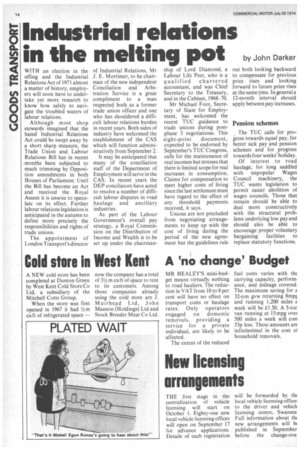Industrial relations in the melting pot
Page 18

If you've noticed an error in this article please click here to report it so we can fix it.
by John Darker
WITH an election in the offing and the Industrial Relations Act of 1971 almost a matter of history, employers will soon have to undertake yet more research to know how safely to navigate the troubled waters of labour relations.
Although most shop stewards imagined that the hated Industrial Relations Act could be swept away by a short sharp measure, the Trade Union and Labour Relations Bill has in recent months been subjected to much trimming by Opposition amendments in both Houses of Parliament. Until the Bill has become an Act and received the Royal Assent it is unwise to speculate on its effect. Further labour relations legislation is anticipated in the autumn to define more precisely the responsibilities and rights of trade unions.
The appointment of London Transport's director of Industrial Relations, Mr J. E. Mortimer, to be chairman of the new independent Conciliation and Arbitration Service is a great compliment to a man respected both as a former trade union officer and one who has shouldered a difficult labour relations burden in recent years. Both sides of industry have welcomed the establishment of the CAS which will function administratively from September 2.
It may be anticipated that many of the conciliation staff of the Department of Employment will serve in the CAS. In recent years the DEP conciliators have acted to resolve a number of difficult labour disputes in road haulage and ancillary industries.
As part of the Labour Government's overall pay strategy, a Royal Commission on the Distribution of Income and Wealth is to .be set up under the chairman ship of Lord Diamond, a Labour Life Peer, who is a qualified chartered accountant, and was Chief Secretary to the Treasury, and in the Cabinet, 1968-70.
Mr Michael Foot, Secretary of State for Employment, has welcomed the recent TUC guidance to trade unions during postphase 3 negotiations. This eight-point document, expected to be endorsed by September's TUC Congress, calls for the maintenance of real incomes but stresses that there is limited scope for real increases in consumption. Claims for compensation to meet higher costs of living since the last settlement must have regard to the effect of any threshold payments received, it says.
Unions are not precluded from negotiating arrangements to keep up with the cost of living during the period of the new agreement but the guidelines rule out both looking backward to compensate for previous price rises and looking forward to future price rises at the same time. In general a 2-month interval should apply between pay increases.
Pension schemes
The TUC calls for progress towards equal pay, for better sick pay and pension schemes and for progress towards four weeks' holiday.
Of interest to road haulage, for long saddled with unpopular Wages Council machinery, the TUC wants legislation to permit easier abolition of wages councils. Those that remain should be able to deal more constructively with the structural problems underlying low pay and should also be able to encourage proper voluntary bargaining facilities to replace statutory functions.
































































































